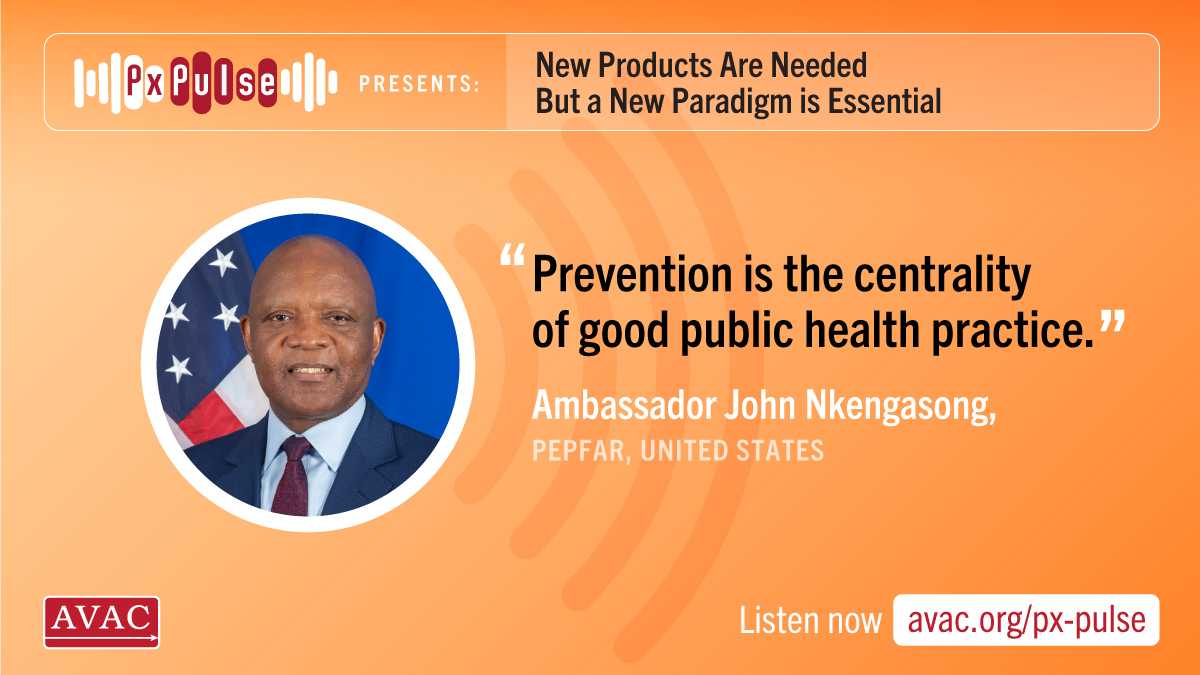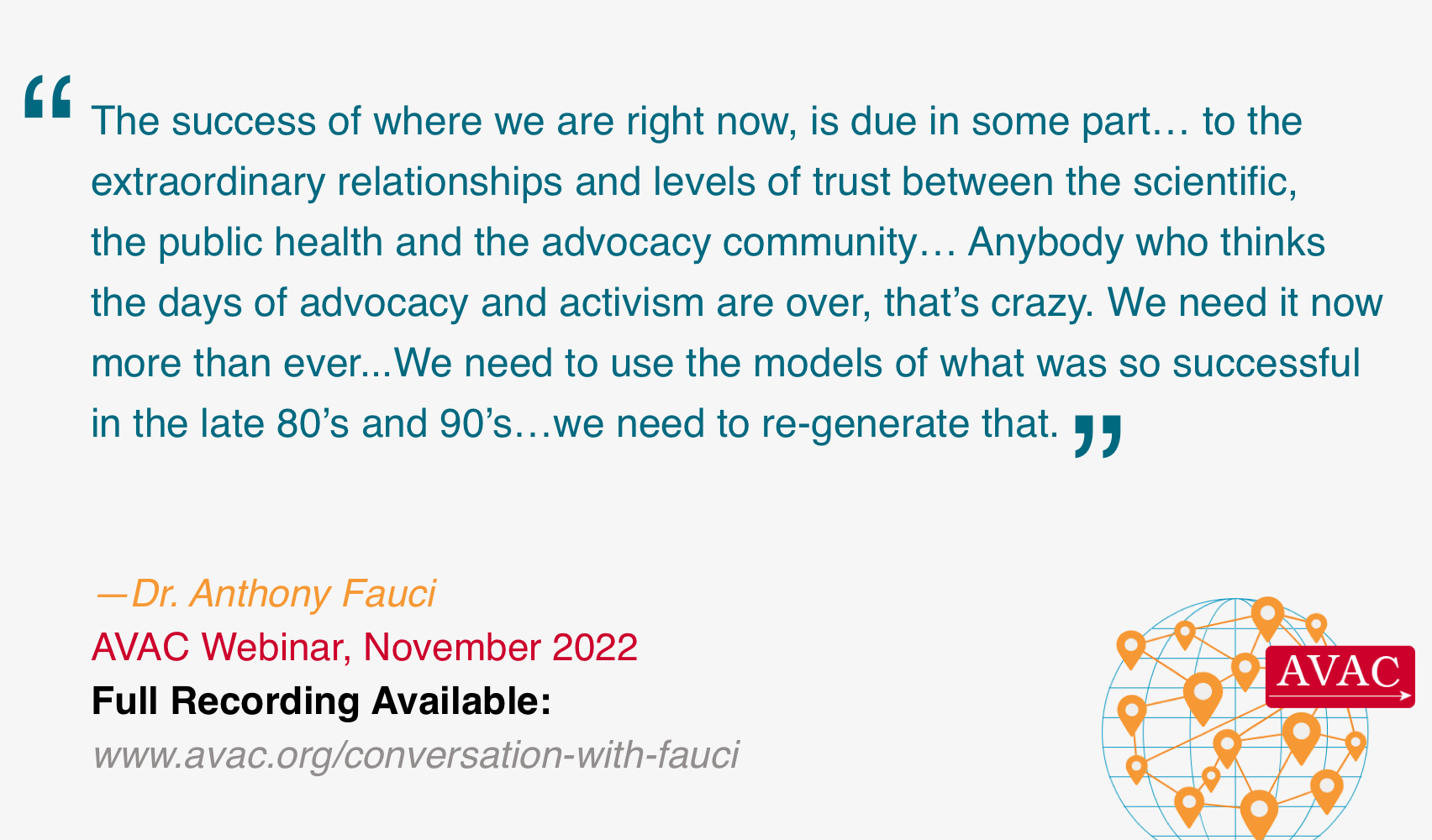In mid-October, AVAC attended the World Health Summit in Berlin. Historically hosted by the German government, this year marked the first time the Summit was jointly led with the WHO (World Health Organization).
While there was lots to talk about in the three days of the summit, four areas for the coming year are clear priorities.
COVID, COVID, and more COVID
Structures that worked
The global response to COVID-19, particularly the collective failures in preventing spread and severe disease and death, dominated WHS 2022. Bright spots in the global response were noted throughout the meeting—systems known as infection prevention and control (IPC), set up in response to Ebola and HIV/AIDS, were successfully deployed in many places against COVID-19. But glaring gaps stood out. Questions around equity in the distribution of vaccines and treatments, manufacturing capacity, and cooperation across governments were pushed off to next year’s summit. Still, the laser focus on strengthening structures to respond to future pandemics was long overdue. For years, few have prioritized resources for pandemics, even as HIV/AIDS, cholera, hepatitis, and Ebola posed chronic challenges.
Other COVID highlights
In one session devoted to HIV/AIDS (featuring inaugural Virchow Prize winner PEPFAR Ambassador John Nkengasong), some panelists called for increased domestic resource mobilization. This issue is complex and deserves attention. Overall, national government funding makes up 60 percent of global HIV/AIDS resources, and countries are facing compounding challenges in raising funds for public health due to increasing need to divert domestic resources to debt repayment. Just this past week, advocates wrapped up the inaugural Africa Health R&D Week where community leaders discussed the importance of and challenges involved in increasing domestic financing of research and development in African countries. Advocates at the World Health Summit noted that many of the major failures in the COVID-19 response occurred in high-income countries, for example in the US. Some of the most successful responses were mounted in Senegal, Ghana, Vietnam, and many Pacific Island nations, and we saw successful vaccine rollouts in Chile, Uruguay, Nepal, and Cambodia. One shortcoming from the program as a whole was that the summit featured far too few speakers and advocates from countries that had success in stopping the spread in spite of funding constraints.
Community Engagement
WHO Initiatives
Meaningful inclusion of civil society & communities, or the lack thereof, was a major theme of the summit. A town hall with WHO Director General Tedros Adhanom Ghebreyesus highlighted new (and almost new) initiatives to broaden the range of voices included in decision-shaping at the WHO (though all decisions are still finalized by Member States only): a recently launched WHO Youth Council and the Civil Society Commission. The Civil Society Commission will be accepting applications in the coming months.
Beyond WHO
Mechanisms for civil society and community engagement were proposed or interrogated during Q&A portions of nearly every session, showing the real appetite among advocates for more meaningful inclusion in decision-making, particularly in forthcoming decisions on the global architecture of pandemic preparedness and response (PPR).
The formation of the WHO’s Intergovernmental Negotiating Body (INB) to draw up a global PPR agreement and the possibly linked Pandemic Fund (officially launched this week at the G20 Summit), developed by a coalition of donor countries, both present great opportunities for civil society participation. But there’s equal risk civil society could end up excluded from key points in the process, resulting in catastrophic failure to allocate resources to those that need them most.
Where is the money?
All roads lead to primary health care – that was the conclusion reached at every session. The answer to reaching the ‘last mile,’ to expanding access to the most vulnerable groups and key populations, to health system resiliency in the face of concurrent pandemics, to routine immunization challenges, and to quality surveillance of emerging threats is a strong, robustly staffed primary health system in every country. Advocates, institutional leaders, and multilateral champions are all aligned on this, but the funding hasn’t yet followed. As siloed, disease-specific emergency funding continues to drive the world’s efforts (even at WHS with large new commitments to polio from the German government and the Gates Foundation), where is the funding for health systems? Historically, global health security initiatives have not sufficiently considered the role of primary health systems in pandemic prevention and response. High-income countries and donors have typically been much more interested in surveillance, epidemiology, and monitoring than broad health systems strengthening. With no other global funding mechanism devoted to building such a foundation, Pandemic Fund presents a real opportunity to jumpstart global commitment to strong, inclusive, resilient health systems that are ready to weather future challenges. These health systems are prerequisites for hitting targets against global health threats, and finally overcoming decades-long challenges.
What does all of this mean for HIV?
The global attention to PPR structures presents a critical opportunity to drive progress toward the 2030 goals. The systems and structures created by the HIV/AIDS response provide a model for what to do and what not to do. Infrastructure and stakeholder engagement, with civil society recognized as equal partners, have brought innovation and measurable success. But progress has been uneven and unequal, with key populations continuing to be left behind, and far too many decisions controlled by Global North decision-makers. The institutions and groups working on PPR now have much to learn. Integration of global health priorities is essential to meeting 2030 goals. Those ‘in the room where it happens’ must prioritize comprehensive inclusion of community and civil society and growing the pot of resources to address health inequities, and retaining commitment to ending current pandemics and epidemic threats as much as future ones.




